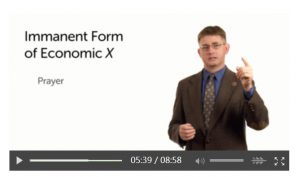 Last summer (pretty much exactly one year ago) there was a mostly-online discussion of the doctrine of the Trinity in evangelical circles. It was a fast-moving, multi-platform scuffle on many fronts. There was a lot of heat, and also a lot of light, and several exceptionally good blog posts written. Here’s a good, linked bibliography.
Last summer (pretty much exactly one year ago) there was a mostly-online discussion of the doctrine of the Trinity in evangelical circles. It was a fast-moving, multi-platform scuffle on many fronts. There was a lot of heat, and also a lot of light, and several exceptionally good blog posts written. Here’s a good, linked bibliography.
In November 2016 the enterprising folks at Logos Mobile Ed rounded up a number of the participants in that discussion and asked them to declare their views, which they have now assembled into a well-planned (though not super-well-titled) package called Perspectives on the Trinity: Eternal Generation and Subordination in Tension (Lexham Press, 2017). Click through to the product page for the full description of the course. The main speakers for the course are me, Kevin Giles, Millard Erickson, Bruce Ware, and Wayne Grudem, with help from Michael Bird and Scott Harrower. The course sells for $150 but is currently marked down to $90, which is why I’m posting this note today.
If you followed the 2016 discussion at all, you’ll recognize Grudem and Ware as one side of the conflict, and Giles and Erickson as another side. You may wonder what a fifth wheel like me is doing on the road, and why I get to be the first speaker in the course. I think the answer is that I’m providing a broader context for the dispute, and am self-consciously speaking for the tradition of classical Trinitarianism. So the emphasis of my presentation falls definitely on the value of the doctrine of eternal generation in the setting of a not-social doctrine of the Trinity. I’m not trying to stay out of the fight (or “tension,” as the title has it) altogether, but I’m definitely speaking into it from some distance back.
Well, that is the advertisement! Now here is the free content to thank you for your attention: In one of the segments of my presentation, I lay out (maybe for the first time in print or on film? I’m not sure) a way of thinking about Trinitarian revelation that a lot of my students have found helpful. It’s a guideline for considering how we should construe the revelation of God in Christ (which sounds important, right?) using some technical terms that are in themselves somewhat dubious (sounds wonky, right?). The technique is to consider a phenomenon of the economy of salvation and to ask about its immanent-Trinitarian form. Here’s the explanation:
There are some things we know we don’t read back into the immanent Trinity, the eternal being of God, as a revelation of who He is. Where this gets really interesting is in certain interactions among Father, Son, and Spirit.
So, for instance, think of prayer.
Should we say, when we see Jesus praying to the Father, “What I see in Jesus praying to the Father who sent Him is that from all eternity the Son prayed to the Father”? This is where theologians start giving different answers about the relationship between the Father and the Son in eternity as it’s disclosed to us in the history of salvation.
In my opinion, when we see prayer happening, it would be wrong to just rush straight to saying the eternal Son always prays to the eternal Father. That’s because in eternity, within the essence of God in the happy land of the Trinity above all worlds, prayer seems like too small of a thing, too specific and discursive a thing, to say is going on in the life of God. Because you would immediately have to start thinking of things like: Is it prayer couched in words? Is it prayer based on needs? Is it prayer based on adoration? And when you do a little biblical theology of what prayer is and ask which parts of that biblical theology of prayer could apply to inside of the Trinity in eternity past, you end up having to say something like this—and it’s kind of an awkward phrase, but I find it helps me out of a lot of tight spots in trying to think this through theologically—you’d ask yourself, “What is the immanent form of economic (fill in the blank)?”
So in this case, “What is the immanent Trinitarian form within the life of God of economic prayer?”
Sometimes you can come up with a good answer, there is an easily available word. Sometimes there is a biblical way of thinking about it that the Bible itself gives us a name to call it. Other times you just have to say it’s whatever the transcendental correlate of this economic thing is. That is to say, at home in the happy land of the Trinity from all eternity, in the very being of God, the Son has always done something toward the Father. Has He prayed? No, but He has done whatever the eternal heavenly counterpart of prayer is within the life of God.
Now, of course, the incarnate, resurrected, ascended Son does pray in a much more literal, human way, being still human. I’m not talking about that. I am talking about the eternal life of God, the very essence of God as it’s triunely configured.
“Whatever the eternal heavenly counterpart of prayer is within the life of God.”
Selah.
I think you can see how this conceptual technique applies to questions about the Son’s submission to the Father. I connect some of the dots in the rest of the lecture.